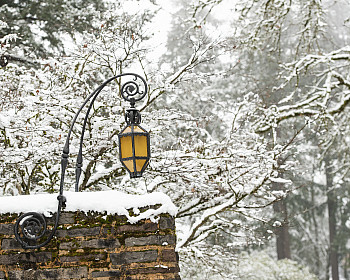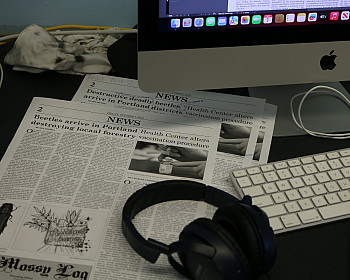Alex Chew
The more I learned about L&C, the more I knew that it would be a great fit for what I was hoping to get from college.

Pronouns
they/them
Degree and Class Year
BA ’25
Hometown
Clovis, California
Major
English
Minor
Gender Studies
Extracurriculars
Gender Studies Symposium co-chair, Synergia Journal of Gender Thought and Expression co-editor, Palatine Hill Review contributor and editorial board member, Prison Abolition Club (PAC)
Overseas study
Granada, Spain (fall 2023)
What three words would you use to describe L&C?
Contains Hidden Gems
What’s your favorite class? Why?
Feminist Theory with Kim Brodkin is such an interesting and enjoyable class. The texts we engage with are deeply fascinating, moving, heartbreaking, and compelling, and I feel that this served as the perfect capstone for my gender studies experience and L&C. Kim is such a generous, compassionate, and intentional professor, and she makes this class particularly engaging.
What made you want to come to Lewis & Clark?
I knew that I wanted to be in a small, liberal arts environment, and L&C was recommended to me as a school that would match the criteria I was looking for. The more I learned about the campus, the more I knew that it would be a great fit for what I was hoping to get from college.
Did you visit campus before deciding to come to L&C? How did your visit influence your decision to attend?
I did visit campus before making my final decision, and that visit allowed me to envision myself attending this school. I knew it was an environment I would want to spend four years in.
What do you like or find most interesting about your major? What about your minor?
I have loved every course and every professor that I have had in both the English and gender studies departments. The two subjects intersect in so many interesting ways, and both departments have allowed me to explore many different aspects of these areas that I’m passionate about. I particularly enjoy getting to perform literary analysis in my English classes, and gender studies is continually challenging and expanding the way I view the world.
Tell us about your support systems and social outlets on campus: people, activities, clubs, res halls, etc.
My favorite way to engage on campus is through the activities I am involved in. Serving as a Gender Studies Symposium cochair and a Synergia editor in particular are both exciting and rewarding opportunities to engage with issues that I care about, and I get to work with very talented and passionate people as part of the process.
What advice do you have for incoming students?
Our campus is small, but there are so many opportunities to get involved with different groups, both related to interests you already have as well as in areas you’ve never even considered or perhaps never had the opportunity to try. I would encourage you to show up to a number of club meetings to find the one or two that seem like a good fit for you, take classes outside of your department, and attend campus events as often as you are able to. You never know which meeting, class, or event might be the one to spark a new interest.
Tell us about the upcoming Gender Studies Symposium. What has your experience as a cochair been like? How does this event complement your academic experience?
I’m so excited about the upcoming Gender Studies Symposium! We have very prolific and wonderful keynotes coming to visit, and a wide-ranging and impressive array of student and community member work to share. Being a cochair has been a very exciting and rewarding process so far; it’s such a privilege to get to work with such a great team and be a part of something that has so much engagement from the campus and the wider community. Serving on the symposium planning committee was what made me realize I wanted to be a gender studies minor in the first place, and helping to put together the symposium has allowed me to take what I have learned in my classes and find a way to make those concepts accessible to the wider community. It’s also a great opportunity for me to learn about a wide variety of perspectives and ideas that I haven’t encountered elsewhere in my studies.
If you went on a New Student Trip with College Outdoors, how did it shape your experience as an incoming student?
I strongly recommend going on a New Student Trip if you have the opportunity to. I was fortunate enough to receive financial aid to go, and it was such a formative experience in allowing me to meet people and form connections before the semester even started. Going on a trip with other students, especially with a group that included a number of other trans people, allowed for us to share a bonding experience that is hard to replicate on campus. Some of the people I met on that trip are still close friends of mine after four years, so I’m immensely grateful to the NST program for that.
If you have studied or will study overseas while at Lewis & Clark, how did you choose your program? What did your overseas study add to your L&C experience?
I knew that I wanted to study in a Spanish-speaking country, and the Granada program had a lower barrier to entry in terms of fluency than some of the other programs. I also knew that I wanted to participate in a home-stay program, and that turned out to be one of the most educational elements of the whole experience. Being abroad gave me access to experiences and learning opportunities I couldn’t have had on campus or anywhere in the U.S., and though I didn’t take any classes that related directly to my major or minor, I would say that my semester abroad was my most challenging, valuable, and educational semester as an L&C student. I would encourage anyone who is able to to spend a semester abroad; it is an opportunity that won’t arise again, and it is an invaluable chance to learn about yourself and the world in an entirely different environment than you are used to.
More Admissions Stories
Admissions is located in Frank Manor House on the Undergraduate Campus.
MSC: 32
email admissions@lclark.edu
voice 503-768-7040
fax 503-768-7055
Vice President of Admissions and Financial Aid
Eric Staab
Admissions
Lewis & Clark
615 S. Palatine Hill Road
Portland OR 97219


